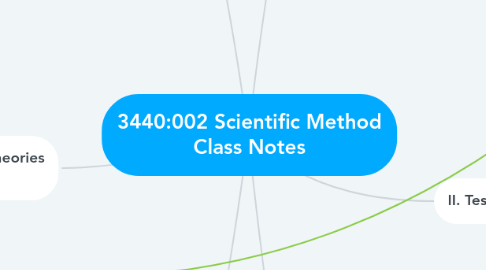
1. III. Common Mistakes in Applying the Scientific Method
1.1. bias
1.1.1. opinions
1.1.2. skewed perspective
1.1.3. prior belief
1.1.4. negligence
1.1.5. favortism
1.2. mistake(s)
1.2.1. overlooked
1.2.2. not controlled
1.2.3. relying on logic
1.2.4. problematic
1.2.5. misunderstanding
1.2.6. accident
1.2.7. boo-boo
1.3. ignorance
1.4. peer pressure
1.5. error
1.6. confirmation bias
1.7. expected outcome
1.8. predisposition
2. IV. Hypotheses, Models, Theories and Laws
2.1. methods
2.1.1. process of elimination
2.1.2. how it's done
2.1.3. technique
2.1.4. routinue
2.1.5. repetition
2.1.6. approach
2.2. hypothesis
2.3. testing
2.4. reliability
2.5. laws
2.6. differences
2.7. models
3. V. Are there circumstances in which the Scientific Method is not applicable?
3.1. specific
3.1.1. individual
3.1.2. one of a kind
3.1.3. defined
3.1.4. precise
3.2. parameters of mesurement
3.3. repeatable
3.4. circumstances
3.4.1. situational
3.4.2. environment
3.4.3. subjective
3.4.4. occurrence
3.4.5. context
3.4.6. specific
3.5. special cases
3.6. exceptions
3.7. useful
3.8. no
4. I. Four Steps
4.1. steps
4.1.1. four
4.1.2. observation of phenomenon
4.1.3. formulation of hypothesis
4.1.4. requirement
4.2. process
4.3. test
4.4. bias
4.5. procedure
4.5.1. flowchart/process flow
4.5.2. a way of doing things
4.5.3. replicatable
4.5.4. structure
4.6. theory
4.7. formula
4.8. observation
4.9. analysis
4.10. repeatable
4.11. examination
4.12. science
5. II. Testing the Hypothesis
5.1. testing
5.1.1. predictions
5.1.2. comparisons
5.1.3. multiple attempts
5.1.4. trial and error
5.1.5. reveal capabilities
5.1.6. observable
5.2. disprove
5.2.1. failure to disprove
5.2.2. out of the box thinking
5.2.3. alternate solution
5.2.4. negate
5.2.5. challenge
5.2.6. contradict
5.2.7. strengthen
5.3. control group
5.4. experiment
5.5. theory
5.6. consideration
5.7. hypothesis
5.8. proof
6. VI. Conclusion
6.1. summary
6.2. conclusion
6.3. results
6.4. answers
6.5. evolving
6.6. analysis
6.6.1. a result of an analysis
6.6.2. examination
6.6.3. inspection
6.6.4. review
6.6.5. evaluation
6.7. wind-up/wind-down
6.8. culmination
6.9. the end
6.9.1. closing of the article
6.9.2. ending the "Introduction..."
